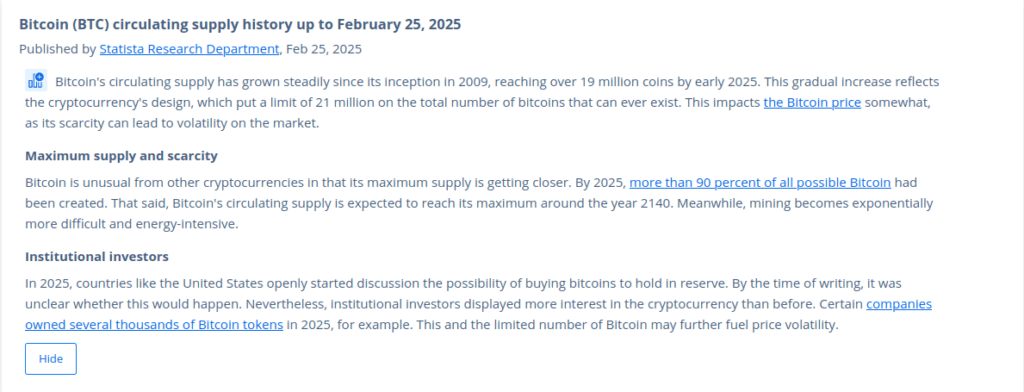-
Bitcoin as a reserve currency could empower Africa with decentralization and inflation resistance but demands navigating volatility to stabilize fragile economies.
-
Adopting Bitcoin requires agile tech infrastructure and anti-corruption regulations to unlock cross-border efficiency while curbing financial risks.
-
Blockchain’s transparency may disrupt Africa’s corruption cycles, yet Bitcoin’s viability relies on government innovation and public adoption of decentralized trust.
Bitcoin as a reserve currency has been a heated debate over the previous decade, with countries like El Salvador taking a leap into the unknown. With African nations now taking a step towards a blockchain-filled world, an intense debate among economists, policymakers, and tech enthusiasts has ensued. The question in everyone’s mind is simple: can a decentralized reserve currency do what most fiat currencies have failed at? Let’s take a dive into exploring the advantages of Bitcoin as a reserve currency in Africa, navigating the intricate highs and lows of this bold move.
Bitcoin as a reserve currency, hit or miss for Africa
Starting From the Basics: What Are Reserve Currencies?
A reserve currency represents a significant quantity of money that central banks and other major financial institutions maintain to prepare for transactions, investments, international debt obligations, and a cushion for the local exchange rate. Many commodities, including oil and gold, are priced in the reserve currency. Countries hold such currency to pay for these goods.
Traditionally, the US dollar has dominated this space, accounting for approximately 59% of global reserves as of 2025. Other reserve currencies include the euro, the Japanese yen, and the British pound. With the recent de-dollarization debate gathering momentum, the Chinese Yuan has been fronted as a possible reserve currency—a steady, slow but sure indication of radical change.
For Africa, the issue of reserve currencies remains particularly important. Many African economies heavily rely on natural resources priced in the US dollar, including diamonds, gold, and oil. Consequently, African countries have often struggled with inflation and currency fluctuations, significantly affecting their economies.
ALSO, READ: The Rise of AI as a Guardian in the NFT Ecosystem
Moreover, many African countries have limited access to international financial markets. Thus, these nations suffer economic sanctions, are often subject to political instability, and face further exacerbation of their economic challenges. This sparks an interesting debate on the future of reserve currencies in Africa.
The Rise of Bitcoin: A Decentralized Reserve Currency Option
Bitcoin’s steady rise and mass adoption have gotten many government regulators worried it could destabilize national currencies and eventually rise to the world’s reserve currency status. Its fixed supply of 21 million coins creates a form of digital scarcity that appeals to those seeking protection against inflationary monetary policies.
However, many uncertainties remain regarding Bitcoin’s capacity to replace the US dollar’s standing as the world’s reserve currency. Although many investors and crypto enthusiasts have long lauded Bitcoin as a superior alternative to fiat currencies, conventional market professionals argue differently. Nevertheless, the debate of Bitcoin vs. Traditional Reserves in Africa sparks an interesting viewpoint. An outlook into whether Africa will adopt Bitcoin as a reserve currency would require policymakers to consider both sides of such a move going into the future.
Advantages of Bitcoin as a Reserve Currency
Secure and Decentralized
When classifying Bitcoin as a decentralized reserve currency, centralized entities, including the government or a central bank, do not control it. Because of its decentralization, Bitcoin stands as more secure and less susceptible to government control or meddling. Essentially, when considering the future of reserve currencies in Africa, Bitcoin takes an astronomical lead since it directly solves a major issue in most, if not all, African governments: corruption.
Cross-Border Transactions
One of the major advantages of Bitcoin as a reserve currency is the absence of intermediaries like banks or payment processors. This implies that users can complete cross-border transactions swiftly and affordably without costly currency conversions or transaction fees. This might be especially helpful for African nations with limited access to international financial markets and eliminates the high cross-border transaction costs often imposed by some East African payment services.
Hedge Against Inflation
The world’s biggest cryptocurrency made waves in 2025 after flirting with the $100,000 mark. According to Statista, more than 90% of all possible Bitcoin has been created. This presents a new dilemma, which most regard as digital scarcity. Lower supply means higher demand, thereby increasing prices.

Statista rating and reading.[Photo: Statista]
Bitcoin Volatility Impact on African Financial Stability
Despite its potential benefits, Bitcoin’s volatility impact remains a significant concern for African economies. The volatility stems from crypto’s immature markets and investor speculation. In 2025 alone, Bitcoin experienced price swings of over 30% in a single month, highlighting the risks associated with using such an asset for reserve purposes. This poses an interesting question regarding its use and applications.
The majority of individuals often think Bitcoin was designed to be hoarded, but in actuality, it was designed for daily use. Satoshi Nakamoto essentially designed the original cryptocurrency not as a hoarding material but rather for daily use—a mere deduction or opinion that is a casualty of Bitcoin’s high volatility.
Bitcoin Adoption by African Governments: Current Trends
In recent years, we have witnessed increasing Bitcoin adoption by African governments as the scope of the industry’s application continues to drop jaws. Countries like Nigeria and South Africa have emerged as regional leaders in cryptocurrency adoption, with significant portions of their populations using Bitcoin for remittances, commerce, and investment. Blockchain technology has proven countless times its boundless applications, and various African governments have taken steps to implement it.

South Africa has taken the initiative to aid its citizens and nation into transitioning into the ongoing crypto wave.[Photo: Coin-Gape]
Bitcoin vs. Traditional Reserves in Africa: A Comparative Analysis
Bitcoin uses sophisticated technology requiring a high level of technical ability to develop and maintain. Many analysts might say African nations lack the technology to adopt it, but we at Web3Africa strongly oppose this notion. In fact, Africa is brimming with innovators, geniuses, and young talent that supersedes the entire globe altogether.
For instance, the common and heated debate of Bitcoin vs. Traditional Reserves in Africa has intrigued many young talents to figure out how best to make a difference. For too long, many African nations have depended on traditional financial systems only to be met with failure, corruption, and a deep-seated evil called credit cards. As a result, innovators have dived into cryptocurrency—e.g., Nigeria, a nation filled with talent seeking to improve their country after the grand failure of its CBDC.
This trend has rippled throughout Africa, causing a radical shift in mentality. Nations like South Africa foresaw this movement, and their governments accommodated it rather than fighting it. Kenya is already undergoing that radical shift after the high transaction costs of its native payment system became painfully clear.
The Future of Reserve Currencies in Africa
Looking ahead, the future of reserve currencies in Africa appears increasingly diverse, digital, and, most importantly, transparent. Corruption has been a deep-seated plague in most African states, with its fangs embedded in many governments. Blockchain technology, Web3, and Bitcoin as a reserve currency offer a solution.
Keep in mind, this isn’t to say Bitcoin can fully replace traditional reserve currencies. Bitcoin has its uses and failures, justifying why many African governments have opted to research it first. Fortunately, one prime factor remains: transparency and anti-corruption sit at the cornerstone of blockchain technology. With proper regulations, we may bear witness to Bitcoin’s potential. El Salvador is doing pretty well, so you never know.
If you enjoyed our article, feel free to sign up for our newsletter and join our community for entertaining, real, and factual news. You can sign up below to gain a sneak peek at our analysis and predictions.
